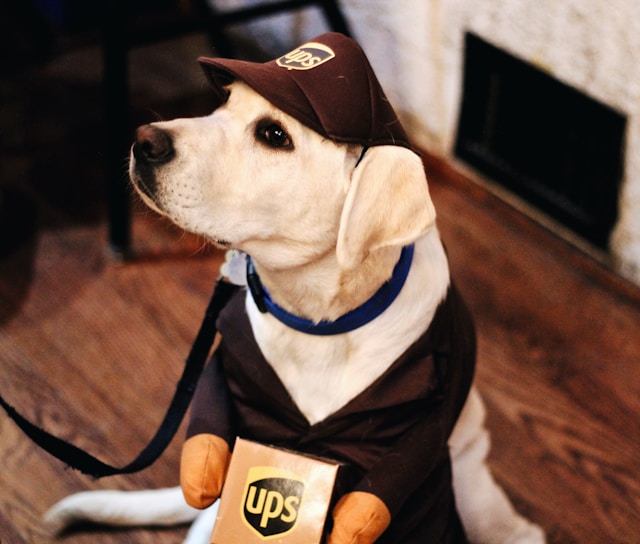Once upon a time in the bustling world of logistics and parcel delivery, there was a company that stood tall, a beacon of reliability and efficiency. This company was UPS, a brand known worldwide for its signature brown trucks and exceptional service. But behind the scenes, what really sets UPS apart is its ingenious marketing strategy. This story explores the marketing magic that has transformed UPS from a simple messenger service into a global leader in logistics.
The Humble Beginnings
Before UPS became a global giant, it started as a small messenger service in Seattle, Washington, back in 1907. James E. Casey and Claude Ryan began with a simple vision: to provide the best service and value to their customers. This core principle has been the foundation of UPS’s marketing strategy for over a century. From the very beginning, the focus has been on reliability, efficiency, and customer satisfaction.
Branding with Brown
One of the most recognizable aspects of UPS’s marketing is its consistent use of the color brown. But why brown? In the early 1920s, UPS adopted brown uniforms and trucks to project a professional and sophisticated image. The color choice was strategic—brown was associated with neatness and cleanliness. Over the years, this choice has become iconic, making UPS easily identifiable across the globe. The “Big Brown” trucks are more than just vehicles; they are a moving symbol of trust and dependability.

The Tagline: “What Can Brown Do for You?”
UPS’s marketing prowess is perhaps best encapsulated in its long-running slogan, “What Can Brown Do for You?” Launched in 2002, this tagline positioned UPS as a service-oriented company willing to go above and beyond for its customers. The message was clear: UPS is here to serve, whether it’s delivering a package across town or shipping goods around the world. This customer-centric approach has been a key element in building brand loyalty and trust.
Leveraging Technology: UPS My Choice
In the digital age, UPS has embraced technology to enhance customer experience. One of the standout innovations is UPS My Choice, a service that gives customers greater control over their deliveries. Launched in 2011, UPS My Choice allows recipients to track packages in real-time, receive alerts, and even reschedule deliveries to suit their convenience. This service has not only improved customer satisfaction but also demonstrated UPS’s commitment to adapting to changing consumer needs.

Environmental Responsibility: UPS’s Green Initiatives
In recent years, sustainability has become a crucial aspect of corporate responsibility, and UPS has been at the forefront of this movement. Recognizing the environmental impact of its operations, UPS has implemented a range of green initiatives. The “Rolling Laboratory” program, for instance, involves a fleet of alternative fuel and advanced technology vehicles designed to reduce emissions and improve fuel efficiency. UPS has also invested in carbon offset programs and renewable energy projects to minimize its carbon footprint. These efforts are not just about environmental responsibility—they also form a significant part of UPS’s marketing narrative, appealing to eco-conscious consumers and businesses.
Campaigns that Connect: UPS Wishes Delivered
One of UPS’s most heartwarming marketing campaigns is “Wishes Delivered.” Launched in 2014, this annual campaign invites customers to submit their holiday wishes, which UPS then strives to fulfill. From delivering surprise gifts to families in need to supporting community projects, “Wishes Delivered” showcases UPS’s dedication to making a positive impact. The campaign not only spreads holiday cheer but also reinforces the company’s image as a caring and community-oriented brand.
Global Reach with a Local Touch
While UPS operates on a global scale, it has always maintained a local touch in its marketing strategy. Understanding that different regions have unique needs and preferences, UPS tailors its marketing efforts to resonate with local audiences. For example, in Asia, where e-commerce is booming, UPS has focused on providing efficient logistics solutions for online retailers. In Europe, where sustainability is a key concern, UPS highlights its green initiatives and efforts to reduce environmental impact. This localized approach ensures that UPS remains relevant and relatable to customers around the world.

Partnering for Success: UPS and the Olympics
Sponsorship and partnerships have been integral to UPS’s marketing strategy, and one of the most notable collaborations is with the Olympic Games. As the official logistics partner for several Olympic events, including the 2012 London Olympics and the 2016 Rio de Janeiro Olympics, UPS showcased its logistical expertise on a global stage. These partnerships not only enhanced UPS’s brand visibility but also demonstrated its capability to handle complex and large-scale operations, reinforcing its position as a leader in logistics.
Innovation in Delivery: UPS Drones and Robotics
In logistics, staying ahead of the curve is essential. UPS has been proactive in exploring innovative delivery solutions, such as drones and robotics. In 2019, UPS made headlines with its drone delivery service, UPS Flight Forward, which became the first company to receive FAA approval for a drone airline. This service has been particularly useful in delivering medical supplies to remote areas. Additionally, UPS has been experimenting with autonomous delivery robots in urban environments, aiming to enhance efficiency and reduce delivery times. These cutting-edge initiatives not only showcase UPS’s commitment to innovation but also create exciting marketing opportunities by highlighting the company’s forward-thinking approach.
UPS Capital: Expanding the Value Proposition
To further differentiate itself from competitors, UPS has expanded its services beyond logistics. UPS Capital, the financial services arm of the company, provides customers with a range of solutions, including cargo insurance, trade finance, and payment solutions. This diversification adds value to UPS’s core offerings, making it a one-stop shop for businesses seeking comprehensive logistics and financial services. By addressing the broader needs of its customers, UPS strengthens its market position and enhances customer loyalty.
The Human Element: UPSers
Behind every successful delivery is a dedicated team of UPS employees, affectionately known as UPSers. The company places a strong emphasis on employee engagement and recognition, understanding that happy employees lead to satisfied customers. UPS’s marketing efforts often highlight the stories of these employees, showcasing their hard work and commitment. For instance, the “Driving Change” campaign featured UPS drivers who go above and beyond to serve their communities. By humanizing the brand and celebrating its workforce, UPS fosters a sense of pride and connection among employees and customers alike.
Crisis Management: Navigating Challenges
No brand is immune to challenges, and UPS has faced its fair share of crises over the years. However, the company’s approach to crisis management has been commendable, turning potential setbacks into opportunities to reinforce its brand values. For example, during the COVID-19 pandemic, UPS played a critical role in delivering essential supplies and supporting vaccination efforts worldwide. The company’s swift response and commitment to service during this global crisis not only bolstered its reputation but also highlighted its resilience and reliability.
Learning from the Masters: Key Takeaways for Marketers
The story of UPS is a treasure trove of insights for marketing professionals. Here are some key takeaways from UPS’s marketing strategy:
- Consistency is Key: UPS’s consistent use of the color brown and its iconic branding elements have made it instantly recognizable. Consistency in branding helps build trust and familiarity with customers.
- Customer-Centric Approach: From the “What Can Brown Do for You?” tagline to the UPS My Choice service, UPS’s focus has always been on enhancing customer experience. Understanding and addressing customer needs is crucial for building loyalty.
- Embrace Innovation: UPS’s investment in technology, such as drones and robotics, demonstrates the importance of staying ahead of industry trends. Embracing innovation can create new opportunities and keep a brand relevant.
- Localize Your Efforts: UPS’s tailored marketing strategies for different regions highlight the importance of understanding local markets. A one-size-fits-all approach rarely works in a diverse global landscape.
- Tell Your Story: Humanizing the brand by sharing employee stories and showcasing community initiatives helps create a strong emotional connection with customers. Storytelling is a powerful tool in marketing.
- Sustainability Matters: UPS’s green initiatives resonate with eco-conscious consumers and demonstrate corporate responsibility. Sustainability should be an integral part of modern marketing strategies.
- Be Prepared for Crises: How a brand handles challenges can significantly impact its reputation. UPS’s effective crisis management during the COVID-19 pandemic is a testament to the importance of preparedness and swift action.
Conclusion: The Legacy of UPS
UPS’s marketing strategy is a testament to the power of consistency, customer focus, innovation, and community engagement. From its humble beginnings as a small messenger service to its current status as a global logistics powerhouse, UPS has continually evolved while staying true to its core values. For marketing professionals, the lessons from UPS’s journey offer valuable insights into building a strong, resilient, and customer-centric brand. As the world of logistics continues to change, UPS’s commitment to excellence and innovation ensures that it will remain a leader in the industry for years to come.
And so, the tale of UPS continues, a story of reliability, innovation, and unwavering dedication to its customers. In the ever-changing landscape of logistics and marketing, UPS stands as a shining example of how to create a brand that not only delivers packages but also delivers trust, value, and inspiration.

